#Israel Horovitz
Text
fighting off the adrock nepotism baby allegations on tiktok AGAIN !!!
7 notes
·
View notes
Text
"What about saying something you believe in, making those anthems from the fraternity house as important as sermons from barricades? Why, in a sense, did these punk initiates not take up the gauntlet thrown down by rebel rockers like The Clash, or translate 'Anarchy In The UK' into a north American setting? Speaking to Playboy's Charles Young in 1987, Adam Yauch touched on this issue.
"What most adults don't understand about most teenagers is that most teenagers are extremely conservative most of the time, even as they are engaging in obnoxious behavior designed to differentiate themselves from most adults. Most teenagers enjoy a heavily structured life, are threatened by deviations from the conforming norm and will ridicule those enamored of deviating from the conforming norm. In this way, most teenagers are exactly like most adults, the only difference being that teenagers piss their lives away in high school while adults piss their lives away in corporations. Most teenagers do, after all, grow up to be most adults."
Speaking as Licensed To Ill was about to top the American album charts, Yauch's right to pontificate seems not unreasonable. To those weaned on the all-out attack philosophies of the punk era, his views may seem profoundly distressing, but at least he could point to his success as vindication of his notions and his approach to his music. Even if this is all Licensed To Ill is - a reassuring shot of brattish obnoxiousness from a troupe of clever young men who've given it enough anti-establishment credibility to make their record appear dangerous to adults while remaining accessible and desirable to the sought-after teenage audience - it is still a considerable achievement. Some may even make claims for it being subversive. And a few people well placed to make such a judgment have made claims for its validity as art. Admittedly, Israel Horovitz could hardly be described as an impartial judge, but his comments to The Los Angeles Times are revealing.
"If people can't see the humor and satire in the record, I don't know what to say to them," Adrock's father said. "It's all so obvious. I think the thing that makes the record so good is that it shows a real understanding of people; maybe not an understanding of 49-year-olds, but certainly of 17-year-olds. I am delighted beyond description; it's like a kid taking over the family store."
Certainly, in defense of the album's nihilism, it can be argued that the record represents a startling warning to the political and social establishments that sought to have its makers hounded out of the public eye. If one is to try to understand the album in any serious sort of way, you have to consider its worth, as Horovitz Senior is hinting, as a piece of satirical social observation. What can we learn of adolescent America in 1986 from this record? Maybe not much we didn't already know; teenagers, as Yauch told Playboy, are often as reactionary and scared of change as their parents, and largely bored most of the time, play at being tough in front of their mates when in reality their insecurities prevent them from being assertive enough, and have given up on any hope that they have a meaningful influence on their society. It is surely not a mere coincidence that levels of apathy among first time voters in the United States and western Europe reached new peaks during these years. As governments in the USA and Britain, in particular, became convergent around a single political philosophy, with voter choice being limited to one of two parties (Republican and Democrat, Conservative and Labour) whose defining parameters all but vanished, it seemed as though a line had been drawn in the social sands. You were either part of the consensus and happy to participate in it, or you stood on the outside with no real hope of influencing events. Youth should be a time when your dreams and ideals are nurtured and encouraged, yet to so many young people growing up in the so-called industrialized west of the mid-to late-80s, ideals were all too often things you sacrificed for profit, dreams nothing more than the unattainable goals of hopeless romantics. It's little wonder so many people decided to take a turn away from the way things had been done before - and even a decision to step into a mental and philosophical void seemed like a tempting move compared to the other options available. So, in adopting these caricatures and living out this fantasy lifestyle, the Beasties were actually providing positive role models, by seemingly proving the validity of an imagination and demonstrating that it was possible to succeed on the older generation's terms - i.e. financially - by making a virtue of what they sought to take away from you.
This point was never fully appreciated at the time, though, and the rather more dubious parts of the band's package were allowed to overshadow the whole. It's interesting to note that similar mistakes of appreciation and perception are still being made: for example, most discussion of Be Here Now, the third album by Manchester rock band Oasis - routinely described through the mid-90s, like the Beasties before them, as "the bad boys of rock" - concentrated on its deficiencies or otherwise sonically and the band's failure to radically alter the formula of their earlier records. Yet in its lyrics, the album offers messages of hope and encouragement to dream and keep positive in the face of institutionalized apathy: "Say something, shout it from the rooftops off your head" (from 'It's Getting Better (Man!)') may well prove to be as defining a lyric to the present generation as Bob Dylan's 'Blowin' In The Wind' had been three decades earlier, precisely because of the song's helpless lack of specificity."
- Rhyming & Stealing: A History of the Beastie Boys by Angus Batey
58 notes
·
View notes
Text
(New York Jewish Week) — The corner of Ludlow and Rivington streets in New York City is now officially known as Beastie Boys Square.
The co-naming of this Lower East Side street corner — where the shop featured on the Jewish rappers’ second album, “Paul’s Boutique,” once stood — was the result of a 10-year effort spearheaded by Leroy McCarthy, an activist who has successfully lobbied for other New York City streets named in honor of rappers, including Notorious B.I.G. and the Wu-Tang Clan.
Hundreds of New Yorkers packed the downtown intersection Saturday afternoon for the official unveiling of Beastie Boys Square. Though some kvetched about the humidity and the unexplained 80-minute delay, the Gen X-heavy crowd — plus a smattering of their offspring — was a respectful one, singing along to years’ worth of Beastie Boys songs played on loudspeakers as they waited for the ceremony to begin, and for the appearance of the two people everyone had come to see: Adam “Ad-Rock” Horovitz and Michael “Mike D” Diamond.
Horowitz, Diamond and Adam “MCA” Yauch, who died in 2012 at 47, formed their highly influential band in New York City in 1981. Though they started as a teenage punk band, they eventually pivoted to hip-hop — and after their first rap album — 1986’s “Licensed to Ill,” produced by fellow Jewish hip-hop fan Rick Rubin — produced a series of hits, the Beastie Boys became household names.
The group followed up with 1989’s sample-heavy “Paul’s Boutique” — featuring the photograph of the Lower East Side street corner — which flopped upon its release but is now widely considered a masterpiece. Their next albums, 1992’s “Check Your Head” and 1994’s “Ill Communication” were cultural juggernauts, and four more albums followed.
All three Beastie Boys have Jewish backgrounds: Horovitz, 56, grew up on Park Avenue, the son of playwright Israel Horovitz and a Roman Catholic mother. Diamond, 57, grew up on the Upper West Side; his father, Harold, was an art dealer and his mother, Hester, was a famous decorator and art collector. Yauch hailed from Brooklyn Heights, the only child of Frances, a Jewish social worker, and a non-Jewish architect.
In 2004, the group gave a very Jewish interview with Heeb magazine, in which Yauch disclosed he was trying to get his Uncle Freddy to teach him some Yiddish “so I could work some Yiddish lyrics on an album.” Diamond said he was raised by “a Barney Greengrass family,” referring to the famous Upper West Side appetizing shop.
Following Yauch’s death from cancer, the group disbanded. So, on Saturday, anticipation crept up alongside the mercury in the thermometer as the crowd waited to catch a glimpse of the remaining Beasties.
But first, local politicians had things to say. Kicking off the speeches with a “mic check” or two was Manhattan Borough President Mark Levine, who put the Beasties’ Jewishness front and center.
“I was 16 when ‘Licensed to Ill’ came out — it was like a thunderbolt came down and struck me,” he said. “Now, I know these guys didn’t advertise it, but trust me: Every Jewish kid in America, we knew they were Diamond and Yauch and Horowitz.”
“Were you a Jewish kid in America back in the 80s and 90s?” Levine shouted to the crowd, and many — including this reporter — cheered back. “Yes you were! Personally, that was the first moment I realized there was maybe a faint hope that I could be cool. It didn’t work out, but I still have hope.”
As it happens, the Beasties have a few Jewish lyrics in their stable, including biblical references, a shoutout to Ellis Island, and Ad-Rock’s line “Well I’m a funky-ass Jew and I’m on my way/ And yes I got to say f— the KKK” on “Right Right Now Now” from the 2004 album “To the 5 Boroughs.”
Three other local politicians spoke: Assembly member Grace Lee and City Council members Carlina Rivera and Christopher Marte, the last of whom Levine credited with making Beastie Boys Square happen.
“You have no idea how hard it is to get a street renamed in New York,” Levine said of Marte. “He did it.”
The activist McCarthy’s initial proposal for Beastie Boys Square was rejected by Community Board 3 in 2014 because the name change didn’t meet requirements. McCarthy was subsequently barred from reapplying for the name change for another five years. His renewed proposal was approved in 2022 with the support of Marte and other local politicians. In 2013, a small Brooklyn playground was named for Yauch.
At last, it was time for the main event, and Horovitz and Diamond took to the stage while the crowd cheered. Horovitz, who said he “brought notes,” spoke first, exclaiming that he didn’t realize other people would be speaking. “Sorry if I’m saying what they said,” he said, thanking McCarthy and “everyone who loves Beastie Boys music.”
“I don’t really understand why, but I know that I love it, so in a way that makes us kind of friends, right?” he added. “Like we bonded over these weird records, so thank you.”
He also thanked New York City, not only for the street renaming, but “for teaching us what to look at, what to listen to, what to wear, how to love, how to live.”
Next, Diamond took the mic, thanking the crowd for coming despite the heat. “Everyone is so dedicated, willing to put in the work to show the love, not only for this band, but, I think, everything we came from, coming from New York City.”
After giving a shoutout to his deceased parents, Diamond also expressed his love for New York, saying that the Beastie Boys couldn’t have come from anywhere else. “Growing up here in New York City and hearing all this incredible music, being all this incredible art, being around all these incredible people — this only in New York City,” he said. “So thank you so much, y’all.”
He concluded his remarks with moving words for Yauch, whom he described as their “brother on this amazing journey.” The crowd responded with chants of “MCA! MCA!”
But Horowitz, who appeared to get a bit verklempt as he concluded his speech, arguably summed up the meaning of the event best.
“We walk around these streets and we don’t really think about who they’re named after, like Ludlow Street, Irving Street, Father Demo Square,” he said. “But it makes me really happy to know that some kid on their way to school 50 years from now is gonna pass by this and look up and be like, ‘What the f— is a Beastie Boy and why do they have a square?’ Just like I did when I was a kid, looking at Perry Street, Charles Street, wondering what it’s about.”
23 notes
·
View notes
Photo
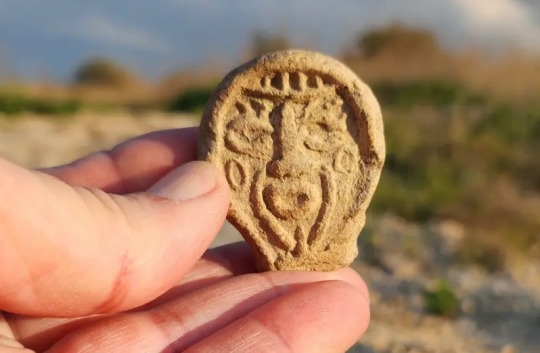
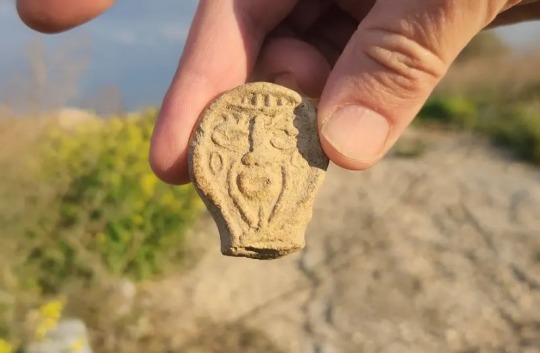
An Ornamental 1,400-Year-Old Decorative Clay Figure Found in Israel
Lavi family finds artifact on hike in central Israel; IAA says Byzantine-era item is a candle holder, finding is ‘typical,’ though not all candles had such ornaments.
A family found an ornamental 1,400-year-old clay figure on the ground while hiking through the hills south of the city of Modiin on Saturday.
Doron, the father of the Lavi family from the central town of Tzur Yitzhak, contacted the Israel Antiquities Authority (IAA) when they came upon the artifact during their travels, the IAA said in a statement on Tuesday.
The face was the decorative end of a candle holder dating from the 6th-7th Century in the Byzantine era, according to research by Dr. Itamar Taxel, the head of the ceramic specialties branch at the IAA.
Though not an especially rare find, it was a “fine” object, said Issy Kornfeld, the archaeologist who arrived to collect the artifact.
“The clay candles were used for lighting and were a typical find from these periods. But not every candle had a holder, and certainly not a designed one,” he said.
“The candle that the holder belonged to was used for the practical function of lighting, and also as an ornamental object,” he added.
Eli Eskosido, director of the IAA, thanked the Lavi family for carrying out an “act of good citizenship” and handing the artifact over to the state body.
He noted that strong rains brought on two weeks ago by powerful winter storm Barbara had likely cleared the earth, paving the way for the discovery of more artifacts.
“We call the public to be vigilant, and if you come across an ancient find, leave it in its place and call the IAA, which will come to the field,” he said, adding that artifacts provide important information for research.
By MICHAEL HOROVITZ.
#An Ornamental 1400-Year-Old Decorative Clay Figure Found in Israel#ancient candle holder#ancient artifacts#archeology#archeolgst#history#history news#ancient history#ancient culture#ancient civilizations#ancient art#byzantine era
34 notes
·
View notes
Text
youtube
Angekündigungstext:
Das Massaker am 7. Oktober hat gezeigt, was „Befreiung“ vom Meer bis zum Fluss, also die Zerstörung Israels, wie sie im Programm der Hamas festgeschrieben ist, bedeutet: Mord an Jüdinnen und Juden weltweit. Der „schrecklichste Tag für Juden seit dem Holocaust“ (David Horovitz) traf die israelische Gesellschaft in einer tiefen Krise. Diesen Moment ausgenutzt zu haben, könnte sich für die Hamas und den Iran als Fehler erweisen. Denn die israelische Demokratie kann angesichts der Katastrophe zu einem neuen Zusammenhalt finden.
Über die Aktualität des Zionismus und über die grauenhafte Gegenwärtigkeit des Antisemitismus spricht Thomas von der Osten-Sacken. Er ist Geschäftsführer von Wadi e.V. und freier Publizist.
0 notes
Text
Global Immorality
David Horovitz has written a great article in the Times of Israel, echoing my own bafflement. http://aqurette.blog/Sy6vmC
0 notes
Text

My Old Lady: Directed by Israel Horovitz. With Kevin Kline, Michel Burstin, Elie Wajeman, Maggie Smith. An American inherits an apartment in Paris that comes with an unexpected resident.
0 notes
Text
Writing about Montague made me think of other writers I interviewed who claimed close friendships with Beckett. Their attitude can be described only with the Yiddish word 'chutzpah', defined in English dictionaries as 'shamelessness' or 'gall'. I think of Israel Horovitz in this category. His interview took place at his home in New York after he telephoned me in the last frantic May days of 1973 as I tried to organize myself and my family for our Paris sojourn. He had heard of me through Jean and George Reavey and their New York theater grapevine, and because he, too, was 'so close to Sam', he said it was imperative that he 'enlighten' me before I left. I had not heard of a Horovitz-Beckett friendship before this, but because I followed up every possibility, I dutifully showed up at his house on Eleventh Street at the time he specified. There were no social preliminaries before he ushered me into a chair. With an elaborate ceremonial flourish, he held out a file folder with a cover that he had obviously hand-decorated himself. He opened it reverently to show me a typed series of questions and answers.
'These are the questions you must address in a biography, and to do so, you will need my answers,' he said. 'You may not use any of your own words or opinions, and you will quote me exactly as it is here. It must be inserted into the middle of your book, so that it opens naturally to these pages, which will be the most important in it.' I was just too stunned to open my mouth. I just sat there holding this object in front of me, all the while wondering how fast I could get out of there. Horovitz was undeterred, beaming as he told me, 'You will not only have the biography of Beckett; you will have the authentic record of his greatest friendship with another great playwright.' It was another 'okaaaay' moment, and needless to say, none of it found its way into the biography.
~Deirdre Bair [buy]
0 notes
Text
Remembering the Fallen: The Tragic Losses of the Beastie Boys
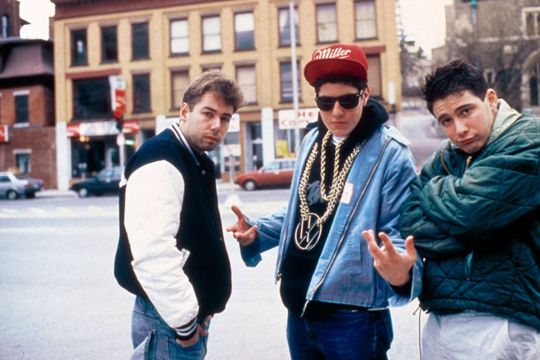
The Beastie Boys are one of the most iconic hip-hop groups of all time. They rose to fame in the 1980s and continued to be relevant well into the 2000s, producing hit after hit and inspiring countless musicians along the way. However, despite their success and longevity, the Beastie Boys have suffered a number of tragedies over the years, including the deaths of two of their members. In this blog, we will take a closer look at these losses and the impact they had on the group and their fans.
The Beastie Boys were formed in New York City in 1981 by Michael Diamond (aka Mike D), Adam Yauch (aka MCA), and Adam Horovitz (aka Ad-Rock). The trio started out as a punk band but soon transitioned to hip-hop, blending the two genres in a way that had never been done before. They released their debut album, "Licensed to Ill," in 1986, and it quickly became one of the biggest-selling rap albums of all time. The Beastie Boys continued to innovate and experiment with their sound over the years, incorporating elements of rock, funk, and jazz into their music and collaborating with artists from a wide range of genres.
However, tragedy struck the group in 2012 when Adam Yauch passed away at the age of 47. Yauch had been diagnosed with cancer in 2009 and had been undergoing treatment for several years. Despite his illness, he continued to be active in the music industry and even directed several films under the name Nathaniel Hornblower. Yauch's death was a devastating loss for the Beastie Boys and their fans, as he had been a central figure in the group since its inception. In addition to his musical contributions, Yauch was also known for his activism and philanthropy, co-founding the Milarepa Fund and the Tibetan Freedom Concerts.
After Yauch's death, the remaining members of the Beastie Boys announced that they would not be continuing as a group. In a statement, they said, "We want to honor the voice of our friend and bandmate, but we also want to respect his wishes that we not continue without him." The group had been working on a new album at the time of Yauch's death, but it was never completed or released.
Sadly, the Beastie Boys suffered another loss in 2021 when Adam Horovitz's father, playwright Israel Horovitz, passed away. While this was not a direct loss for the group, it was still a difficult time for Horovitz and his family, and it undoubtedly brought up memories of Yauch's death.
Despite these tragedies, the Beastie Boys' legacy lives on. They have influenced countless musicians and continue to be celebrated as one of the greatest hip-hop groups of all time. In 2019, the surviving members of the group released a memoir, "Beastie Boys Book," which delves into their history and experiences as a band. The book was praised for its humor, honesty, and insight, and it serves as a testament to the enduring impact of the Beastie Boys' music and message.
In conclusion, the Beastie Boys have suffered two significant losses over the years with the deaths of Adam Yauch and Israel Horovitz. These losses have undoubtedly been difficult for the group and their fans, but they have also served as a reminder of the importance of the Beastie Boys' music and message. While the group will never be the same without Yauch, their legacy lives on, and their influence will continue to be felt for generations to come.
Deveondi new songs
#beastie boys#hip hop music#hip hop#rap#rappers#rapper#musician#musicians#music#celebrity deaths#entertainment news#celeb news#celebrity news#news
1 note
·
View note
Text
The New Netanyahu Government in Israel
When Winston Churchill famously commented that “democracy is the worst form of government, except for all the others,” he was being both witty and trenchant. There is, after all, something just and fair about the people—the demo part of “democracy” from the Greek demos, meaning “the people”—self-governing by choosing as their leaders individuals whose opinions about the issues of the day most closely suit their own. But there is also something deeply problematic about the concept of awarding to the people the right to self-govern without giving some advance thought to what should happen if the people should turn away from decency and justice to embrace principles that are at their core inimical to the wellbeing of the society in which they live. I never seem to tire of noting that the Nazis are believed by historians to have won the election of 1933 fairly, i.e., by getting a majority of voters’ votes—but surely no normal person would argue that that victory by definition made reasonable and just the barbaric laws enacted almost immediately by the demonic cadre of sociopaths who came to power legally in the wake of that fair and free election.
The Founders of our nation saw the problem easily and so invented a kind of democracy in which each of the three branches of government—the legislative, the executive, and the judiciary—all labor under certain restrictions designed to create and maintain a balance of power capable of keeping tyranny from gaining a foothold in our land merely because a would-be tyrant somehow manages to garner a majority of votes in a national election. Our Founders were dreamers, but they were also realists. And they clearly understood the dangers that inhere even in a democracy when a workable system of checks and balances is not put in place to keep any one part of the government from turning away from the core values upon which the republic was meant to rest.
I have been thinking about these issues all week because of legislation the Netanyahu government is planning to bring to the Knesset over the next few months that will effectively and dramatically diminish the power of the judiciary. The proposed bill is a complex piece of legislation, but two core innovations have garnered the most attention and the strongest opposition.
One is the so-called “override” clause that will dramatically constrain the justices of the Supreme Court from attempting to nullify legislation they find to be antidemocratic, discriminatory, of in contravention of Israel’s Basic Laws, the set of laws that function more or less as Israel’s constitution. Under the new law, the Supreme Court will be barred from deliberating at all with respect to the Basic Laws that function as Israel’s constitution, the interpretation of which will henceforth be almost solely in the hands of the legislature.
And the other, related to the first, will basically make it possible for the Knesset to override Supreme Court decisions with a simple majority of sixty-one votes. (There are 120 seats in the Knesset.) In other words, if the Supreme Court finds a piece of legislation to be in contravention of the Basic Laws, they could strike it down…but only with the assent of all the court’s justices. But even that won’t put the matter to rest, since the Knesset could simply vote again on the same law and recertify it as government policy with a majority of one single vote. This is, to my mind, a hugely dangerous move that could conceivably impact on the democratic nature of the State in many different profound ways. Nor am I alone in thinking that: David Horovitz, the founding editor of the Times of Israel, published a piece in his own newspaper earlier this week under the title “Justice Minister Sounds Death Knell for Israel’s Inadequately Protected Democracy.” (To read the piece, click here.) And I read a dozen other essays in the press and across the web expressing similar dismay.
In our nation, Supreme Court decisions can be overridden. But the process is complex, lengthy, and specifically designed to make it impossible for the Congress “just” to override a decision of the Court.
The Court itself, of course, has the power to overturn its own decisions, but the President has no such power: the best an American president can do if he or she is unhappy with a decision of the Supreme Court is to push for a review of a specific law in the hopes that the Court will override its own prior decision. But what about Congress? Article V of the Constitution allows Congress to amend the Constitution if two-thirds of the House and the Senate vote to do so or if two-thirds of the states request such an amendment, and that could in effect override a decision by the Court that a practice or a law was unconstitutional. But such an amendment must then be ratified by three-quarters of the states, and that is a process that can take years. In its darkest hour, for example, the Supreme Court determined in the 1857 “Dred Scott Decision” that enslaved individuals were not American citizens and were therefore not entitled to protection by the government or the court system. And it also determined that Congress had no authority to ban slavery from federal territory. Both parts of the decision were then overturned by constitutional amendment, the part about slaves not being citizens by the Fourteenth Amendment, which granted American citizenship to all people born in this country, and the part about the authority to ban slavery by the Thirteenth Amendment which, in fact, granted Congress the right to ban slavery and, in fact, banned slavery in the United States. So Supreme Court decisions in our nation can indeed be overturned. It just takes a long time and is a very arduous process.
The concept of an “override” clause that allows the government legally to act in contravention of the rights guaranteed to its citizens under the Constitution is not unknown to Western democracies. Section 33 of the Canadian Charter of Rights and Freedoms, for example, is popularly called the “Notwithstanding Clause,” because it awards federal, provincial and municipal governments the right to legislate in ways that contravene the basic rights of citizens for some greater good. The federal government has never availed itself of this right, but some provincial governments, particularly the government of Quebec, have. In Ontario, I remember it being invoked to justify the inherently unfair policy of the provincial government of funding Catholic schools, but neither Protestant nor Jewish ones; the government admitted that this was inherently unfair, but insisted on maintaining the policy “notwithstanding” its inherent inequity because it derived from the original 1841 merger between Upper and Lower Canada that created the Province of Canada. (The Province of Canada was part of the British Empire until the British North America Act of 1867 created the nation of Canada as we know it.) There is no specific parallel to the “Notwithstanding Clause” in American law.
But neither the American method of overriding the Court (i.e., by the long, arduous process of amending the Constitution) nor the Canadian one mentioned above is anything like the proposed legislation in Israel in terms of its ability basically to make it possible for the legislature simply to ignore the Court and vote its way around any decision issued by its justices.
The majority Netanyahu cobbled together to put himself back in power is in many ways an ultra-conservative one that includes among its ministers a criminal like Aryeh Deri, who was convicted of bribery, fraud, and breeching the public trust in 1999 and sent to prison for three years, and who was then convicted again of income tax evasion just last year and fined the equivalent of about $50,000 U.S. But far more troubling are the presence of extremists who have openly questioned the basic civil rights of Israel’s Arab citizens, its LGBTQ citizens, its female citizens, and its non-Jewish citizens. If there was ever a government that is going to need to be reined in by a vigorous, vocal Court devoted not to the political future of the PM or his party but to the moral future of the State itself, it is this one. That not being the case, I fear we are in for a rough ride indeed.
And yet, as I said from the bimah just last Shabbat, we cannot allow our concerns about the government to affect our willingness to support the State of Israel itself. America is more than its government and its political parties. So are all countries, including Israel. I am worried about some of the ministers Netanyahu has appointed—and certainly not just Aryeh Deri—and not sure if their extreme right-wing approaches can or will be vitiated by the presence in the government of calmer, more reasonable types. The future will unfold. Some developments, I suppose, will be regrettable. I have never allowed my distaste for any specific politician to affect the deep sense of patriotic loyalty I bring to my feelings about my own country. And I do not plan to allow any specific policies of the Netanyahu government to weaken my support for Israel itself—for the nation and for its people.
0 notes
Text
Soldier On: A Woman's Memoir of Resilience and Hope by Bracha Horovitz
Soldier On: A Woman’s Memoir of Resilience and Hope by Bracha Horovitz
Soldier On is a true story about what it means to become a woman, and how the heat of hardships can forge strong character and lead to purposeful life.
The daughter of an Auschwitz survivor, author Bracha Horovitz spent her childhood surrounded by people who worked fervently to establish the fledgling nation of Israel after its 1948 independence. Inspired by their resilience and fortitude,…

View On WordPress
0 notes
Text

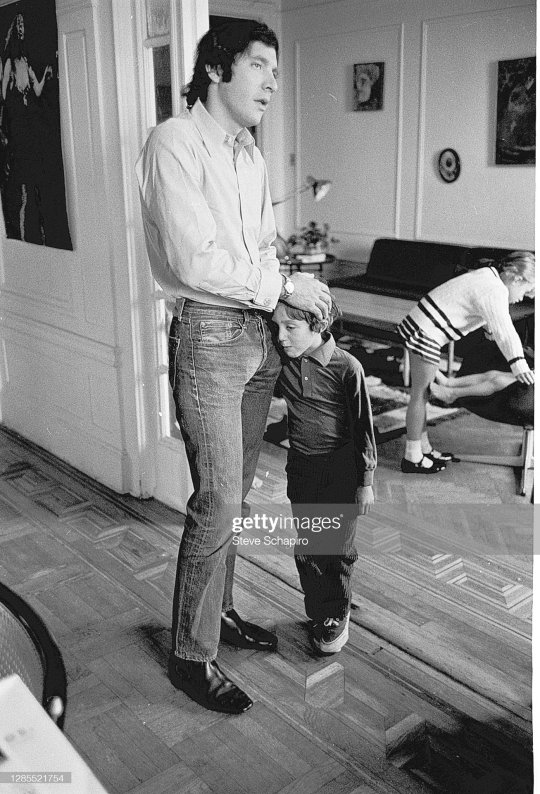

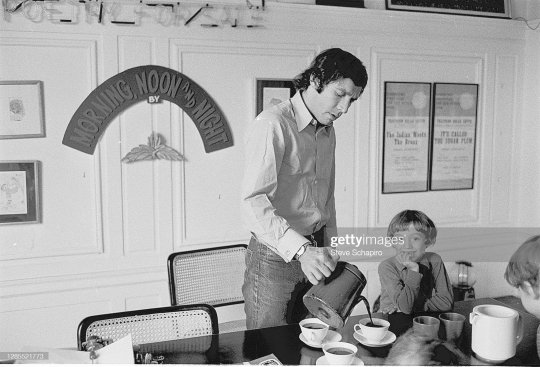
these steve schapiro photos of israel horovitz and adrock's siblings he raised while leaving adrock with his mom are sooo fucked up I'm insane
9 notes
·
View notes
Text
Machine Gun McCain (1969)
Machine Gun McCain (1969)
GIULIANO MONTALDO
Bil’s rating (out of 5): BBB
Original Title: Gli Intoccabili
Italy, 1969. Columbia Pictures, Euroatlantica, Euro International Films. Story by Mino Roli, Screenplay by Mino Roli, Dialogue by Israel Horovitz, freely based on the novel Candyleg by Ovid Demaris. Cinematography by Erico Menczer. Produced by Bino Cicogna, Marco Vicario. Music by Ennio Morricone. Production Design by…
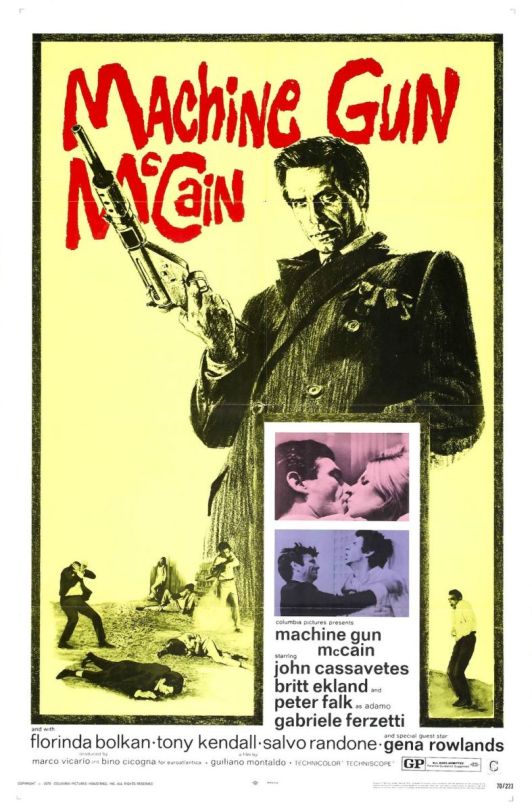
View On WordPress
#Bino Cicogna#Britt Ekland#Cannes 1969#Claudio Biava#Columbia Pictures#Ennio Morricone#Enrico Sabbatini#Erico Menczer#Euplio Moscusu#Euro International Films#Euroatlantica#Flavio Mogherini#Florinda Bolkan#Franco Fraticelli#Franco Riti#Gabriele Ferzetti#Gaetano Imbró#Gena Rowlands#Giuliano Montaldo#Israel Horovitz#Italy#James Morrison#John Cassavetes#Luigi Pistilli#Marco Vicario#Margherita Guzzinati#Maria Mizar#Mino Roli#Mirella Pamphili#Ovid Demaris
2 notes
·
View notes
Photo

Kevin Kline, Maggie Smith und Kristin Scott Thomas sind so feine Schauspieler, daß sie selbst in einem mutwillig gefühlsduseligen, arg konstruierten und absolut vorhersehbaren lahmen Familienrührstück wie My Old Lady noch ein bisschen unterhaltsam sind.
#My Old Lady#Kevin Kline#Maggie Smith#Kristin Scott Thomas#Dominique Pinon#Film gesehen#Israel Horovitz
2 notes
·
View notes
Photo

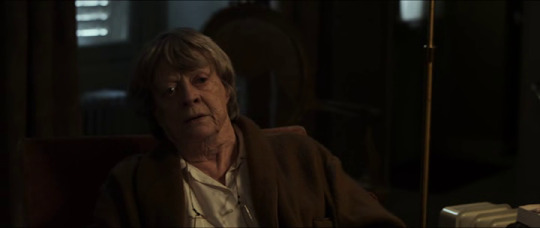
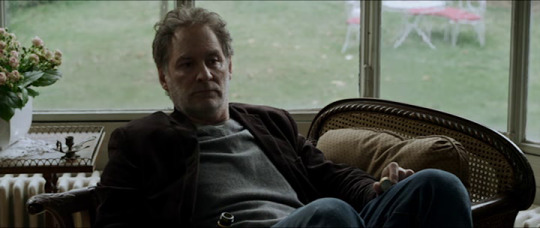
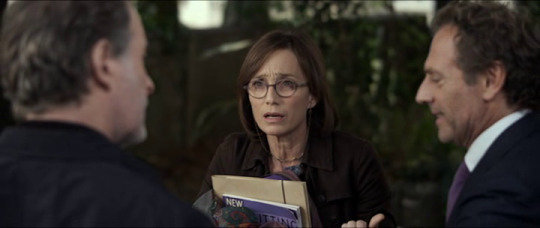
My old lady - 7/10
(Mi casa en París)
8 notes
·
View notes
Photo




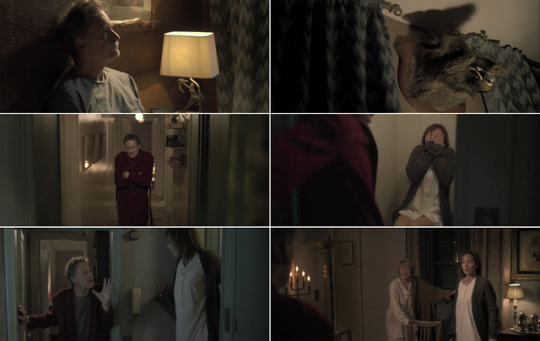
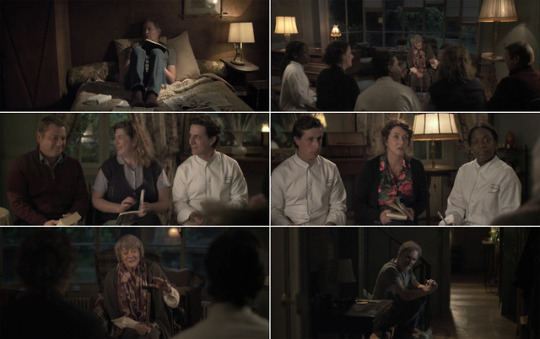


My Old Lady (2014)
#my old lady#Israel Horovitz#play adaptation#comedy-drama film#viager#Kevin Kline#Kristin Scott Thomas#Maggie Smith#british-french film#movies
3 notes
·
View notes